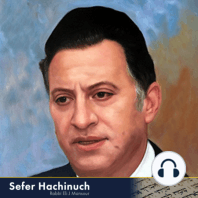20 min listen
Misva #103: Offering the Ketoret (Incense)
FromSefer Hachinuch
ratings:
Length:
20 minutes
Released:
Dec 27, 2021
Format:
Podcast episode
Description
The Torah in Parashat Tesaveh (Shemot 30:7-8) commands that the Ketoret (incense) must be offered on the special gold altar inside the Bet Ha’mikdash each morning and afternoon. The Sefer Ha’hinuch writes that this Misva also includes the obligation to prepare the Ketoret in advance so it can be offered each day. The Rambam maintains that the two daily offerings of Ketoret comprise a single Misva, whereas the Ramban was of the opinion that these constitute two separate Misvot – one to offer Ketoret in the morning, and another to offer Ketoret in the afternoon. The Sefer Ha’hinuch writes that the purpose of the Ketoret is to enhance the aura of grandeur and majesty in the Bet Ha’mikdash. A pleasing fragrance is very enjoyable, and people are drawn to places with a pleasant scent, and thus G-d commanded offering fragrant incense in the Bet Ha’mikdash to produce a pleasing aroma that people will enjoy. In fact, the Gemara comments that when the Ketoret was offered on the altar, the fragrance was so strong that it could be smelled from a distance, in the city of Yeriho. The Ketoret was a composite of eleven spices, four of which are mentioned explicitly in the Torah, whereas the other seven are known from tradition. It was brought each morning and afternoon by either the Kohen Gadol or an ordinary Kohen, except on Yom Kippur, when it was offered specifically by the Kohen Gadol. If, for whatever reason, the Ketoret was not offered in the morning, then a double portion was offered in the afternoon. The afternoon portion of Ketoret was brought after the offering of the afternoon Tamid (daily sacrifice), and before the completion of the preparation of the Menorah for kindling. After five of the seven lamps were prepared for kindling, the Ketoret was offered, and then the final two lamps were prepared. Interestingly, the Sefer Ha’hinuch writes about this Misva, “Ha’maktir Ke’dino Kiyem Aseh” – “One who offers the incense properly has fulfilled an affirmative command.” Normally, the Sefer Ha’hinuch specifies that one who fails to perform the required act has neglected an affirmative command, or, in the case of a prohibition, that one who commits the prohibited act has violated a Biblical prohibition. In this instance, however, he writes that one who performs the required act has fulfilled a Misvat Aseh. Some commentators suggested that the Sefer Ha’hinuch deviated from his normal formulation in this context because it was very unlikely that no Kohen would offer the Ketoret. The Gemara teaches that offering the incense in the Bet Ha’mikdash brought the Kohen wealth, and thus this was a very coveted service which all Kohanim wished to perform. It was therefore not necessary for the Sefer Ha’hinuch to warn that failing to offer Ketoret constitutes the neglect of a Misva, because it was a Misva which everyone sought to fulfill. The Gemara in Masechet Keritut (6) comments that as the spices were ground to prepare the Ketoret, the person who did the grinding would announce, “Hadek Heteb, Heteb Hadek” – “Ground finely, finely ground!” This was done, the Gemara explains, “Mipeneh She’ha’kol Yafeh La’besamim” – “Because the sound is beneficial for the spices.” Somehow, saying these words during the grinding enhanced the quality of the spices. Tosafot explain that the expression “Hadek Heteb, Heteb Hadek” contains four instances of the letter “Heh,” which is pronounced by blowing air, and the warmth of the person’s breath had a beneficial effect upon the spices. A different explanation is given by Abarbanel (Portugal, 1437-1508), who writes that maintaining a rhythm while grinding was beneficial for the spices. Therefore, the person grinding the spices would repeatedly say, “Hadek Heteb, Heteb Hadek” in order to maintain a rhythm during the grinding. Although we are unable to bring the Ketoret in the absence of the Bet Ha’mikdash, the Sages teach that by reading the verses and Talmudic passages that discuss this Misva, we are considered as though
Released:
Dec 27, 2021
Format:
Podcast episode
Titles in the series (100)
Misva #19: The Prohibition Against Eating Hametz on Pesach: Daily Sefer Hachinuch - Brought to you by itorah.com by Sefer Hachinuch
